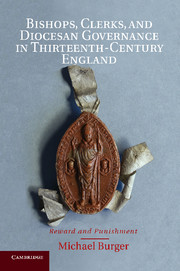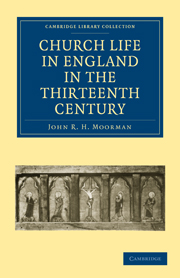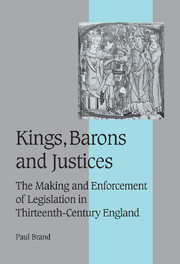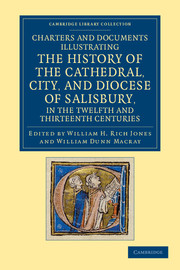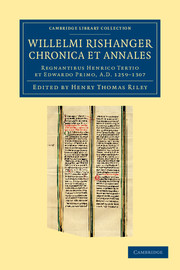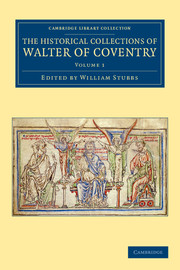Bishops, Clerks, and Diocesan Governance in Thirteenth-Century England
Reward and Punishment
- Author: Michael Burger, Auburn University, Montgomery
- Date Published: September 2014
- availability: Available
- format: Paperback
- isbn: 9781107417427
Paperback
Other available formats:
Hardback, eBook
Looking for an inspection copy?
Please email [email protected] to enquire about an inspection copy of this book
-
This book investigates how bishops deployed reward and punishment to control their administrative subordinates in thirteenth-century England. Bishops had few effective avenues available to them for disciplining their clerks and rarely pursued them, preferring to secure their service and loyalty through rewards. The chief reward was the benefice, often granted for life. Episcopal administrators' security of tenure in these benefices, however, made them free agents, allowing them to transfer from diocese to diocese or even leave administration altogether; they did not constitute a standing episcopal civil service. This tenuous bureaucratic relationship made the personal relationship between bishop and clerk more important. Ultimately, many bishops communicated in terms of friendship with their administrators, who responded with expressions of devotion. Michael Burger's study brings together ecclesiastical, social, legal and cultural history, producing the first synoptic study of thirteenth-century English diocesan administration in decades. His research provides an ecclesiastical counterpoint to numerous studies of bastard feudalism in secular contexts.
Read more- First comprehensive treatment of thirteenth-century English diocesan governance in decades
- First history to make extensive use of the mass of evidence collected in the English Episcopal Acta series
- Uses reward and punishment to provide a fresh look at the operation of the Church and provide a point of comparison between diocesan and secular governance
Reviews & endorsements
'This book will be essential reading for anyone interested in the workings of diocesan administration in thirteenth-century England. In particular, Burger sheds new light on the complex relationship between the bishop and his bureaucrats. We learn why medieval bishops used rewards, particularly the granting of benefices, far more than punishments in dealing with their clerical subordinates, and [he] draws valuable comparisons between developments in episcopal and royal administration. Above all, this book explains how the rise of an administrative church impacted the power of bishops.' Adam Davis, Denison University and author of The Holy Bureaucrat: Eudes Rigaud and Religious Reform in Thirteenth-Century Normandy
See more reviews'Burger's study provides a richly detailed examination of episcopal governance, revealing essential aspects of bishops' rule. He reveals the dark side of thirteenth-century diocesan administration concealed by previous institutional histories - the hunger for patronage, the inconsistencies of service, and the fickle fawning of clerics attempting to advance in the hierarchy. Scholars of medieval rule and its practice, both within and outside the church, will find much of interest in [this] book.' Robert F. Berkhofer, III, Western Michigan University
''Tenure', or a permanent employment contract, remains the aspiration of most employees. What role did such aspirations play in the medieval Church, and how did churchmen resolve the tensions between spiritual service and monetary reward? Could such rewards be diminished or even revoked if a churchman broke with his original patron? These are questions of great significance, yet they have never before been approached with the forensic mastery that Michael Burger brings to his task. [His] study of the benefice fills a major gap in our understanding of patronage. It tells many new and remarkable stories of masters and servants. Of the good, the bad, and the professionally litigious. It deserves to be widely read.' Nicholas Vincent, University of East Anglia
'… will be of interest especially to those readers already acquainted with medieval ecclesiastical administration, but this volume also offers much to those interested in medieval networks of patronage, in a range of relationships between superiors and subordinates, and in the economics and politics of medieval religious life. Though Burger's volume requires commitment on the part of the reader, it repays careful reading with a wealth of detail about one of the most important sets of relationships in the medieval church.' J. Patrick Hornbeck, II, Marginalia Review of Books
'A close investigation of how bishops rewarded, or disciplined and punished their administrative subordinates. Much of the book is prosopographical and examines the granting of benefices, security of tenure, pensions and other rewards (such as gifts, fees and property) before turning to punishments - bonds, excommunication, oaths, prison. Finally, the consequences are examined: patronage hunger, continuity of service, affection and devotion. The author draws on evidence country-wide, making particularly heavy use of the diocesan archives of Lincoln and York.' Northern History
'… this is a valuable and useful discussion of the career relations between English bishops and their dependent administrators. Its evidence may derive from the thirteenth century; but its analysis applies across the later medieval period.' The Catholic Historical Review
'Michael Burger's lucid and often entertaining book takes up the question of how English Bishops wielded power.' Katherine L. French, Sixteenth Century Journal
Customer reviews
Not yet reviewed
Be the first to review
Review was not posted due to profanity
×Product details
- Date Published: September 2014
- format: Paperback
- isbn: 9781107417427
- length: 332 pages
- dimensions: 230 x 153 x 23 mm
- weight: 0.5kg
- availability: Available
Table of Contents
Part I. The Problem:
1. Introduction
2. Dangers of service
Part II. Rewards and Punishments:
3. Benefice for service and for benefit
4. Security of tenure in benefices
5. Pensions
6. Other rewards
7. Punishment
Part III. Consequences:
8. Patronage hunger
9. Continuity and discontinuity in administration
10. Affection and devotion
11. Conclusions: culture and context.
Sorry, this resource is locked
Please register or sign in to request access. If you are having problems accessing these resources please email [email protected]
Register Sign in» Proceed
You are now leaving the Cambridge University Press website. Your eBook purchase and download will be completed by our partner www.ebooks.com. Please see the permission section of the www.ebooks.com catalogue page for details of the print & copy limits on our eBooks.
Continue ×Are you sure you want to delete your account?
This cannot be undone.
Thank you for your feedback which will help us improve our service.
If you requested a response, we will make sure to get back to you shortly.
×
